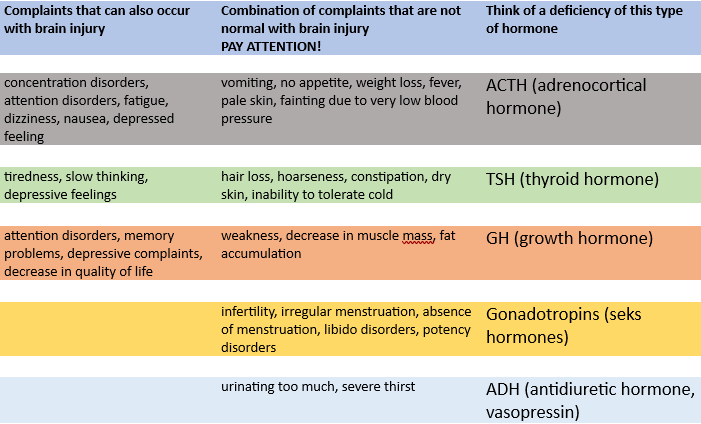Hormonal changes
Hormones
Hormones are signaling substances (messengers) that are produced by glands and certain tissues in the body to keep body functions and body processes in balance (homeostasis).
Hormones are released from hormone-producing glands into the bloodstream, transported in the blood and thus reach the cells or organs they affect.
Function of hormones
Hormones influence, among other things:
- Metabolism
- Organ functions
- Growth and development
- Reproduction
- Water and salt balance
- Storage and consumption of food
- Behavior, feelings and emotions.
The brain and the hormones
Many hormones are produced in the brain.
There are many hormone systems that are controlled by the brain.
The pituitary gland in particular controls many hormone processes, such as those of the adrenal glands, sex hormones and the thyroid gland.
The pituitary gland is controlled by the hypothalamus.
Brain injury and hormonal changes
Vulnerability in brain injury
If the pituitary gland or the hypothalamus or the pineal gland (epiphysis) is damaged due to brain injury, the hormone balance may be disrupted.
The hypothalamic-pituitary axis is vulnerable to the strong mechanical forces that occur during a head accident. The pituitary blood flow
is also vulnerable to blood loss after traumatic brain injury or cerebral hemorrhage or cerebral infarction and also to tumors.
Vague complaints that are not always clear as a hormone deficiency
This can lead to complaints that are not always immediately apparent. There are some similarities between the general complaints after one
traumatic brain injury, which can also indicate reduced functioning of the pituitary gland. This includes fatigue, attention and concentration problems, memory disorders, slowed thinking and the fact that complaints worsen with mental or physical exertion (exercise intolerance). However, dizziness, paleness and nausea are also complaints that can be associated with both brain damage and hormonal deficiencies.

Do not be too quick to assume that complaints are caused by the brain injury. Stay alert to hormone deficiencies.
Warning signs
If new complaints arise, these are warning signs for a doctor.
In case of vomiting, fever, loss of appetite (anorexia), weight loss, pale skin, fainting (collapse) / low blood pressure / life-threatening drop in blood pressure (shock), the doctor will have to consider a deficiency of the ACTH hormone.
A deficiency of ACTH can be life-threatening in the event of unexpected severe stress or an acute illness such as pneumonia. A patient can then, for example, experience an Addison's crisis.
A deficiency of thyroid hormone TSH can manifest itself in hair loss, dry skin, hoarseness, constipation and inability to tolerate the cold, in addition to slowness in thinking, mood disorders (depressive complaints) and fatigue.
In the case of a growth hormone (GH) deficiency, the warning signs are a decrease in muscle mass, a clear increase in fatty tissue (adiposity) and weakness in addition to the more general complaints that could also be associated with brain damage: decrease in quality of life, attention and memory problems and mood disorders. See pituitary gland page.
With a deficiency of the ADH hormone, the warning signs are: extreme thirst (polydipsia) and frequent urination (polyuria).
If there is infertility, too much or too little menstruation, reduced sex drive (libido or potency disorder), the doctor will recommend a
gonadotropic disorder. The production of sex hormones has changed. See pituitary gland page.
The dilemma for a doctor
Not everyone with traumatic brain injury needs to be screened for a hormonal imbalance. However, a disruption of hormones can insidiously disrupt the quality of life and suddenly become life-threatening in acute stress, as mentioned in the Addison's crisis.
It is therefore good that doctors are aware that hormonal changes can occur after brain injury. Also consider staying away longer
of menstruation than six months in women. That needs to be dealt with.
Which hormones are made where in the brain?
We describe the specific consequences per brain area/gland on other specific pages:
- Pituitary gland page
- reproductive hormones, change (irregular or absence) of menstruation, infertility, menopausal complaints, osteoporosis, changed sexual desire, diabetes mellitus / diabetes, enormous fatigue, uncooperative muscles, etc.
- Acromegaly page (excessive growth hormone)
- Addison's crisis page (too little cortisol produced by the adrenal cortex, which is controlled by the pituitary gland)
- Pineal gland/epiphysis page
- biological clock and sleep-wake rhythm (sleep)
- sexual development
- inhibits the development of tumors
- serotonin function (regulates relaxation, stress relief and pain relief, among other things)